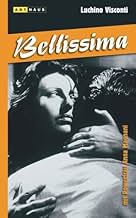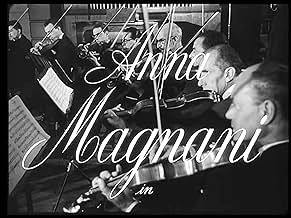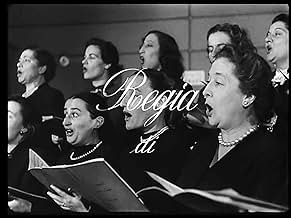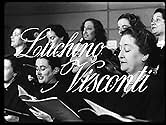VALUTAZIONE IMDb
7,7/10
5864
LA TUA VALUTAZIONE
Una donna della classe bassa cerca disperatamente di far diventare sua figlia una star del cinema.Una donna della classe bassa cerca disperatamente di far diventare sua figlia una star del cinema.Una donna della classe bassa cerca disperatamente di far diventare sua figlia una star del cinema.
- Regia
- Sceneggiatura
- Star
- Premi
- 1 vittoria e 1 candidatura in totale
Liliana Mancini
- Iris
- (as Iris)
Vittorio Musy Glori
- Self
- (as Vittorio Glori)
Recensioni in evidenza
After Rome's Cinecitta Studios announces a call to cast a young girl in a movie, Maddalena Cecconi (Anna Magnani) joins a horde of other parents (mostly mothers) as she drags her daughter Maria (Tina Apicella) to the audition. Although Maria is plain, talentless, and clearly uninterested, Maddalena still pushes through in the hopes Maria raises the family to a higher station in life.
In the film's opening scene during the mass audition, director Luchino Visconti smartly uses an overhead shot of the families crowding into the studio door, much like cattle being crowded into a slaughterhouse. Like the Hollywood classic "Sunset Boulevard" released only a year earlier, "Bellissima" is a creation by the film industry about how horribly the film industry treats people. Although the story occurs at a certain place and time, its message is universal and timeless: beware of the belief that "stardom" will make life better; the relentless pursuit of it could actually make life worse.
The film begins well and its middle section is enjoyable though unexceptional. But they both build up to a final half-hour that is mesmerizing. Its denouement begins with a very clever scene involving a film editor who used to be a renowned actress. From that point and incidents that follow, Maddalena has revelations that are heart-rending and her actions are shocking.
And is it possible to praise La Grande Magnani any more than she has already been praised? I'll try. It has been said that truly great actors have the ability to captivate audiences even when reading aloud the contents of a telephone directory. Magnani could go even further than this. She could captivate an audience even while silently listening to another read to her the contents of said directory. Her face registers so much. Her performance in this film is rightly praised as one of her best. That says a lot. - dbamateurcritic
OUTSTANDING ACHIEVEMENT: Acting by Anna Magnani.
In the film's opening scene during the mass audition, director Luchino Visconti smartly uses an overhead shot of the families crowding into the studio door, much like cattle being crowded into a slaughterhouse. Like the Hollywood classic "Sunset Boulevard" released only a year earlier, "Bellissima" is a creation by the film industry about how horribly the film industry treats people. Although the story occurs at a certain place and time, its message is universal and timeless: beware of the belief that "stardom" will make life better; the relentless pursuit of it could actually make life worse.
The film begins well and its middle section is enjoyable though unexceptional. But they both build up to a final half-hour that is mesmerizing. Its denouement begins with a very clever scene involving a film editor who used to be a renowned actress. From that point and incidents that follow, Maddalena has revelations that are heart-rending and her actions are shocking.
And is it possible to praise La Grande Magnani any more than she has already been praised? I'll try. It has been said that truly great actors have the ability to captivate audiences even when reading aloud the contents of a telephone directory. Magnani could go even further than this. She could captivate an audience even while silently listening to another read to her the contents of said directory. Her face registers so much. Her performance in this film is rightly praised as one of her best. That says a lot. - dbamateurcritic
OUTSTANDING ACHIEVEMENT: Acting by Anna Magnani.
It was as if I had taken a time machine back to 1951. Sitting at the open theater of Tiberina Island in Rome, Anna Magnani's voice bounced off the ancient angles of this stunning roman spot. "Bellissima" is a timeless masterpiece. A rarity in Visconti's oeuvre. He puts all of his uncanny attention to detail to the service of Magnani's bombastic, tender, funny, extraordinary performance. Visconti knew how to bring the best in his actors. Even Maria Callas who, under Visconti's guidance, went from the greatest Opera singer to the greatest actress singing Opera. There are moments in "Bellissima" that can only be described as a love letter from Visconti to Magnani and vice versa. She has a few close ups that tells us how much love, respect and admiration existed between this two enormous artists. Look at her moments in the mirror, combing her hair naturally, debating under her breath the proper pronunciation of a word. She, not a conventional beauty, looks ravishing. The message about the dangers of immediate fame and fortune could have been written today. If you have a chance, don't miss it. If you love film, it's a must!
In "Bellissima" (1951) an overambitious mother drags her 6 year old daughter to a talent show. The theme of "Bellissima" has something in common with "Little miss sunshine" (2006, Dayton & Faris). In both cases the daughter has no chance against the barby dolls that are her opponents. In "Little miss sunshine" the initiative is however by the daughter herself (although her parents ought to do more to protect her). In "Bellissima" the initiative lays cleary by the overambitious mother.
"Bellissima" was the end of the neo realist period in the carrier of Luchino Visconti, after films such as "Ossessione" (1943) and "La terra trema" (1948). The film is situated in a workers environment but live in this environment is no longer as bad as it was in the heydays of neorealism. In fact live in the showbusiness of Cinecitta is much more ruthless.
The lead actress Anna Magnani is still a true representative of the neo realist age. Think about her role in "Roma, citta aperta" (1945, Roberto Rossellini). In "Bellissima" she is brilliant as the mother who is cheated by the Cinecitta employees but who is also cheating herself against other mothers and their "bellissima's".
The film tells a rather simple story but makes maximum use of facial expressions and close ups, especially those of Magnani herself and Tina Apicella (playing her daughter Maria). Especially towards the end of the film the close ups are tellng us more than a thousend words.
"Bellissima" was the end of the neo realist period in the carrier of Luchino Visconti, after films such as "Ossessione" (1943) and "La terra trema" (1948). The film is situated in a workers environment but live in this environment is no longer as bad as it was in the heydays of neorealism. In fact live in the showbusiness of Cinecitta is much more ruthless.
The lead actress Anna Magnani is still a true representative of the neo realist age. Think about her role in "Roma, citta aperta" (1945, Roberto Rossellini). In "Bellissima" she is brilliant as the mother who is cheated by the Cinecitta employees but who is also cheating herself against other mothers and their "bellissima's".
The film tells a rather simple story but makes maximum use of facial expressions and close ups, especially those of Magnani herself and Tina Apicella (playing her daughter Maria). Especially towards the end of the film the close ups are tellng us more than a thousend words.
"Bellissima" is structured in a circular and ephemeral plot. Their conflict, which becomes stronger as a situation, is mimesis of reality, of stories so close and common but diversified. In short: the human desire to overcome poverty, even if we stimulate exploitation even more.
The timeless character of this film made in 1951 by Luchino Visconti, is already clear in its synopsis: The story of Maddalena (a nurse), who inscribes his daughter Maria, in a contest that aims to elect the most beautiful girl in Italy. The contest represents a ticket to give the daughter a life that oscillates between dignity and luxury, being that mother-protagonist, ready to everything to guarantee the victory of the daughter.
In a large part of this story that sometimes takes situations and absurd moments, facing a desire that borders the limitations of vision, rationality and absurdity when showing the starting points, play and finalize this saga. That is drawn by a mother motivated by the future of her daughter, this dramatic dimension that is characteristic to the film, if diluted wisely in moments of comedy. Maddalena's attitudes are laughable, all the more so as in the lack of artistic talent of her daughter. This laughs at the other, the role of a fool that plays this mother not to notice in the daughter who lacks other attributes, and the belief that the beauty of the girl, added to the interference of this mother, as in trying to buy the jurors or get someone inside the Production of the film that highlights the test of Maria, that this sum can interfere in the result and consecrate in the victory of Maddalena through the small daughter.
With all the merits of a timeless story, and without regret the fact that the director had in hand a material very close to the neo-realist films that consecrated him, that is, to have something very close to the style that was customary to do, but that is Rejected in "Bellissima", approaching this story through the realistic bias, in which, personally, I consider that it was desirous to the producers of the film and to the director to present a more comprehensive aspect of the fable, considering the common character of this story, that happens and repeats itself In life, and which is now reflected on canvas, but which, in abandoning a reflection of this realism pertaining to a certain social reality, generates a filmic approach that equates maternal desires, however, disproportionate and invalid in face of class differences and consequently incapable of generating Changes, or results, how can you compete with a family that already has a wide advantage? This inequality of classes is mentioned and treated very superficially in the small plots in which they are presented, this minimizes the strength and potentiality of Visconti and Bellissima, since the approach in which it is presented (its form), makes it impossible for itself speech. The struggle to overcome class differences, through methods that reinforce and contribute to these differences. In truth, the mother does not struggle to overcome anything, she wants only to belong to something, and in the end, when she perceives this world of cruel differences that she admired and in which she ended up collaborating, it becomes, then, the moment of rationality and revolt of Maddalena. In portraying cinema as a microcosm of a prosperous world in advantageous possibilities, Visconti satirizes the film industry itself and human innocence in the face of its belief in possibility and belonging. This belief that induces the ability to use mechanisms, but is already dominated by commercial interests, which among others, result in the strengthening of class differences and simulate a fantasy world, such as the cinema and its benefits.
The entire film is anchored by the magnetic and fascinating performance of Anna Magnani, who fills the entire screen with a fiery vitality and intensity that is almost impossible to look away. In 1951, she was one of the queens of Italian cinema and was already echoing all over the world. Anna was the favorite actress of Bette Davis, and Bette considered Anna's performance in "Bellissima" as: brilliant, uninhibited and full of immense power. There is hardly a moment in the movie where it is still or silent. Visconti, almost exclusively, records Anna in medium and full planes, giving her ample room for compositions and promoting seams from one end of the frame to the other.
Between several scenes of fade-in and fade-out that stitch together the film, between jumps of episodic events that collaborate for the construction and the outcome of the plot, it calls the photographic proposal of Piero Portalupi and Paul Ronald, who basically establish a climate of life Obscure in the apartment of Maddalena, in contrast, the reflectors and dazzle of lights of the "Cinecittà", a directing of light that directs not only the convicted desire of Maddalena, but with only enlightened path that offers a perspective, a way out that life between Shadows Another great moment of mastery of this photograph is in the game between half light that illuminates faces or that highlight one among many others, a clear allusion to the pursuit of brilliance and own light that dialogue and much for the construction of "Beautiful".
Although not the most interesting film of Visconti, and leaving aside many of the brands that have consecrated it, "Bellissima" is an interesting work and that dialogues with the contemporary world, and possibly dialogues with the future world, since between the social differences Which we both struggle to overcome, are often unconsciously reinforced through a selfish struggle that seeks only to save some and not realize that it will only result when we understand the need for a whole. Luchino Visconti was able to write for our eyes, an important social and cultural document that reflects on yesterday, analyzes the present and provides paths for tomorrow.
The timeless character of this film made in 1951 by Luchino Visconti, is already clear in its synopsis: The story of Maddalena (a nurse), who inscribes his daughter Maria, in a contest that aims to elect the most beautiful girl in Italy. The contest represents a ticket to give the daughter a life that oscillates between dignity and luxury, being that mother-protagonist, ready to everything to guarantee the victory of the daughter.
In a large part of this story that sometimes takes situations and absurd moments, facing a desire that borders the limitations of vision, rationality and absurdity when showing the starting points, play and finalize this saga. That is drawn by a mother motivated by the future of her daughter, this dramatic dimension that is characteristic to the film, if diluted wisely in moments of comedy. Maddalena's attitudes are laughable, all the more so as in the lack of artistic talent of her daughter. This laughs at the other, the role of a fool that plays this mother not to notice in the daughter who lacks other attributes, and the belief that the beauty of the girl, added to the interference of this mother, as in trying to buy the jurors or get someone inside the Production of the film that highlights the test of Maria, that this sum can interfere in the result and consecrate in the victory of Maddalena through the small daughter.
With all the merits of a timeless story, and without regret the fact that the director had in hand a material very close to the neo-realist films that consecrated him, that is, to have something very close to the style that was customary to do, but that is Rejected in "Bellissima", approaching this story through the realistic bias, in which, personally, I consider that it was desirous to the producers of the film and to the director to present a more comprehensive aspect of the fable, considering the common character of this story, that happens and repeats itself In life, and which is now reflected on canvas, but which, in abandoning a reflection of this realism pertaining to a certain social reality, generates a filmic approach that equates maternal desires, however, disproportionate and invalid in face of class differences and consequently incapable of generating Changes, or results, how can you compete with a family that already has a wide advantage? This inequality of classes is mentioned and treated very superficially in the small plots in which they are presented, this minimizes the strength and potentiality of Visconti and Bellissima, since the approach in which it is presented (its form), makes it impossible for itself speech. The struggle to overcome class differences, through methods that reinforce and contribute to these differences. In truth, the mother does not struggle to overcome anything, she wants only to belong to something, and in the end, when she perceives this world of cruel differences that she admired and in which she ended up collaborating, it becomes, then, the moment of rationality and revolt of Maddalena. In portraying cinema as a microcosm of a prosperous world in advantageous possibilities, Visconti satirizes the film industry itself and human innocence in the face of its belief in possibility and belonging. This belief that induces the ability to use mechanisms, but is already dominated by commercial interests, which among others, result in the strengthening of class differences and simulate a fantasy world, such as the cinema and its benefits.
The entire film is anchored by the magnetic and fascinating performance of Anna Magnani, who fills the entire screen with a fiery vitality and intensity that is almost impossible to look away. In 1951, she was one of the queens of Italian cinema and was already echoing all over the world. Anna was the favorite actress of Bette Davis, and Bette considered Anna's performance in "Bellissima" as: brilliant, uninhibited and full of immense power. There is hardly a moment in the movie where it is still or silent. Visconti, almost exclusively, records Anna in medium and full planes, giving her ample room for compositions and promoting seams from one end of the frame to the other.
Between several scenes of fade-in and fade-out that stitch together the film, between jumps of episodic events that collaborate for the construction and the outcome of the plot, it calls the photographic proposal of Piero Portalupi and Paul Ronald, who basically establish a climate of life Obscure in the apartment of Maddalena, in contrast, the reflectors and dazzle of lights of the "Cinecittà", a directing of light that directs not only the convicted desire of Maddalena, but with only enlightened path that offers a perspective, a way out that life between Shadows Another great moment of mastery of this photograph is in the game between half light that illuminates faces or that highlight one among many others, a clear allusion to the pursuit of brilliance and own light that dialogue and much for the construction of "Beautiful".
Although not the most interesting film of Visconti, and leaving aside many of the brands that have consecrated it, "Bellissima" is an interesting work and that dialogues with the contemporary world, and possibly dialogues with the future world, since between the social differences Which we both struggle to overcome, are often unconsciously reinforced through a selfish struggle that seeks only to save some and not realize that it will only result when we understand the need for a whole. Luchino Visconti was able to write for our eyes, an important social and cultural document that reflects on yesterday, analyzes the present and provides paths for tomorrow.
This is a very small story--a poor woman tries to make her daughter a child movie star--but it has a tremendous, operatic performance from Anna Magnani. Magnani is like all other stage mothers in that the success she desires for the child is really her frustrated ambition for herself (her tiny daughter has no interest in acting, and whines and cries all through the picture), but unlike them in that she never loses her sense of humour. When she realises she has been cheated, instead of becoming outraged, she laughs at her own foolishness, briefly relaxing from her usual blind intensity to become a normal, likable woman.
Her character's desperation to escape her life is understandable when one sees the dump she lives in with her husband and child. The small, dilapidated flat with stained walls, in a building full of fat, sour- faced harpies in hideous housedresses--one never sees such horrors in Hollywood films. Too bad this neo-realism became old-style realism--we could use some of this today as a counter to the candy-floss world we see on TV and in the movies.
One amusing note: The film-struck Magnani says at one point to her husband, "Oh, Burt LanCASter! Molto gentile!" Three years later Lancaster would be playing her lover in The Rose Tattoo.
Her character's desperation to escape her life is understandable when one sees the dump she lives in with her husband and child. The small, dilapidated flat with stained walls, in a building full of fat, sour- faced harpies in hideous housedresses--one never sees such horrors in Hollywood films. Too bad this neo-realism became old-style realism--we could use some of this today as a counter to the candy-floss world we see on TV and in the movies.
One amusing note: The film-struck Magnani says at one point to her husband, "Oh, Burt LanCASter! Molto gentile!" Three years later Lancaster would be playing her lover in The Rose Tattoo.
Lo sapevi?
- QuizIn the final scene, Anna Magnani hears the film playing outside her room and remarks that she hears Burt Lancaster. Magnani would win an Oscar four years later for The Rose Tattoo, in which she would costar with Lancaster.
- ConnessioniEdited into Al centro del cinema (2015)
I più visti
Accedi per valutare e creare un elenco di titoli salvati per ottenere consigli personalizzati
- How long is Bellissima?Powered by Alexa
Dettagli
- Data di uscita
- Paese di origine
- Lingua
- Celebre anche come
- Beautiful
- Luoghi delle riprese
- Ristorante Al Biondo Tevere, Via Ostiense, 178, Roma RM, Italia(Trattoria by the River Tiber)
- Azienda produttrice
- Vedi altri crediti dell’azienda su IMDbPro
- Tempo di esecuzione
- 1h 54min(114 min)
- Colore
- Proporzioni
- 1.37 : 1
Contribuisci a questa pagina
Suggerisci una modifica o aggiungi i contenuti mancanti




























